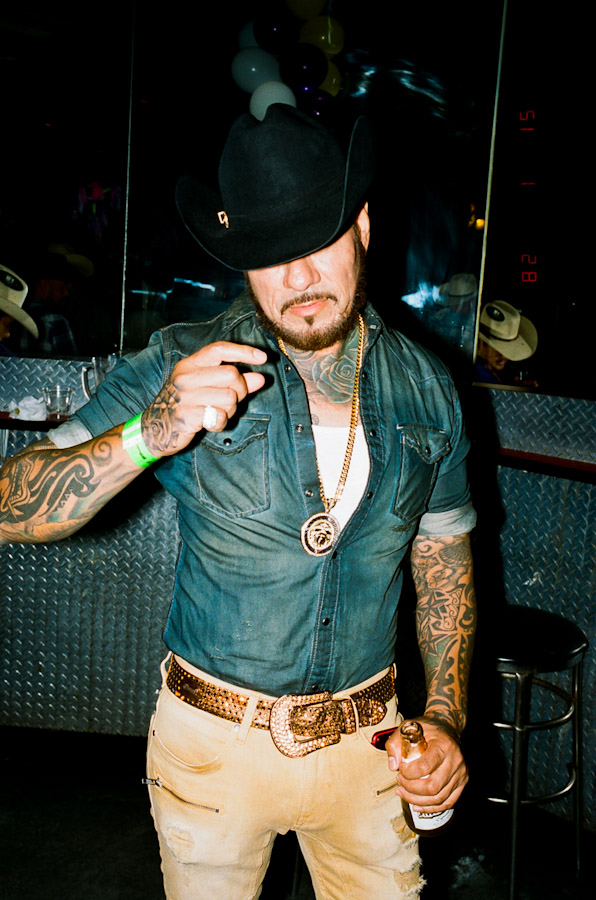A night on the town with LA’s queer Vaqueros
- Text by Miss Rosen
- Photography by Sean Maung

Santa Monica Boulevard is one of Los Angeles’ most fabled thoroughfares, running West from Silver Lake, through Hollywood and Beverly Hills all the way to Ocean Avenue, just off the Pacific.
“There are different areas on Santa Monica that have different flavours,” photographer Sean Maung, an LA native, explains. “When you say ‘Santa Monica Boulevard,’ most people think of West Hollywood, which has a very strong gay and lesbian scene. But I’ve always been really attracted to Santa Monica Boulevard in East Hollywood.”
The random mix of people from local Russian, Thai, and Latino communities appealed to Maung, who has been documenting the street culture of his hometown for over a decade. While photographing transgender prostitutes working the street late at night, Maung saw the words “Club Tempo” on an orange sign in front of a mall and thought to himself, “What’s Club Tempo? And why is it in the back of a strip mall in East Hollywood?’”
He would soon find out. He did a little research and discovered Club Tempo hosted a gay Vaquero (Spanish for “cowboy”) Night – which has been running continuously for the past 26 years. Maung dropped by and was quickly impressed. “There were all these vaqueros and they were just looking so good,” he remembers. “Their style was immaculate and there were so many colours: the boots, the belts, the shirts, and the pants. I love that contrast of being in such a modern city in 2017 and there are still cowboys hanging out. It’s not a costume – it’s a culture.”
The vaquero is a long-standing Mexican archetype, dating back to its colonial past with a distinctly Latin American spin on the culture, music, and attire of the cattle rancher. Many immigrants have a strong desire to hold on to the culture of their youth. Those who come to Vaquero Night are not only looking to meet and mingle as folks do at the club but to celebrate familiar traditions with corridos (ballads), a live mariachi band, and line dancing.
Maung started the photographing with a simple point and shoot camera, but realised he wanted to do more in-depth work. “I asked the manager if I could shoot and he asked why. I told him that this is an amazing scene and the world should see this. He was open to it. From there I went on to bring a backdrop and hung it outside the club so that before the cowboys came in, I would take their pictures. I can speak Spanish and that really helped, but I can’t hustle in Spanish so the security guards always had my back.”
Over the past year, Maung has compiled a body of work that captures the style, pride, and flamboyance of the vaqueros of Santa Monica Boulevard. “People were very open,” he reveals. “They are an integral part of L.A. life.”









See more of Sean Maung’s work on his official website.
Follow Miss Rosen on Twitter.
Enjoyed this article? Like Huck on Facebook or follow us on Twitter.
Latest on Huck

Clubbing is good for your health, according to neuroscientists
We Become One — A new documentary explores the positive effects that dance music and shared musical experiences can have on the human brain.
Written by: Zahra Onsori

In England’s rural north, skateboarding is femme
Zine scene — A new project from visual artist Juliet Klottrup, ‘Skate Like a Lass’, spotlights the FLINTA+ collectives who are redefining what it means to be a skater.
Written by: Zahra Onsori

Donald Trump says that “everything is computer” – does he have a point?
Huck’s March dispatch — As AI creeps increasingly into our daily lives and our attention spans are lost to social media content, newsletter columnist Emma Garland unpicks the US President’s eyebrow-raising turn of phrase at a White House car show.
Written by: Emma Garland

How the ’70s radicalised the landscape of photography
The ’70s Lens — Half a century ago, visionary photographers including Nan Goldin, Joel Meyerowitz and Larry Sultan pushed the envelope of what was possible in image-making, blurring the boundaries between high and low art. A new exhibition revisits the era.
Written by: Miss Rosen

The inner-city riding club serving Newcastle’s youth
Stepney Western — Harry Lawson’s new experimental documentary sets up a Western film in the English North East, by focusing on a stables that also functions as a charity for disadvantaged young people.
Written by: Isaac Muk

The British intimacy of ‘the afters’
Not Going Home — In 1998, photographer Mischa Haller travelled to nightclubs just as their doors were shutting and dancers streamed out onto the streets, capturing the country’s partying youth in the early morning haze.
Written by: Ella Glossop